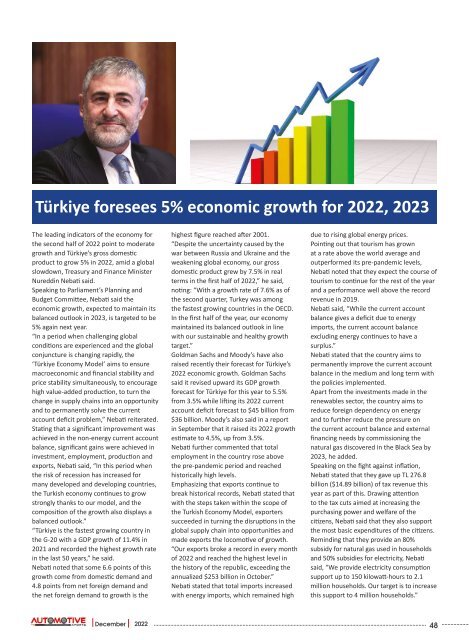Automotive Exports December 2022
Create successful ePaper yourself
Turn your PDF publications into a flip-book with our unique Google optimized e-Paper software.
Türkiye foresees 5% economic growth for <strong>2022</strong>, 2023<br />
The leading indicators of the economy for<br />
the second half of <strong>2022</strong> point to moderate<br />
growth and Türkiye’s gross domestic<br />
product to grow 5% in <strong>2022</strong>, amid a global<br />
slowdown, Treasury and Finance Minister<br />
Nureddin Nebati said.<br />
Speaking to Parliament’s Planning and<br />
Budget Committee, Nebati said the<br />
economic growth, expected to maintain its<br />
balanced outlook in 2023, is targeted to be<br />
5% again next year.<br />
“In a period when challenging global<br />
conditions are experienced and the global<br />
conjuncture is changing rapidly, the<br />
‘Türkiye Economy Model’ aims to ensure<br />
macroeconomic and financial stability and<br />
price stability simultaneously, to encourage<br />
high value-added production, to turn the<br />
change in supply chains into an opportunity<br />
and to permanently solve the current<br />
account deficit problem,” Nebati reiterated.<br />
Stating that a significant improvement was<br />
achieved in the non-energy current account<br />
balance, significant gains were achieved in<br />
investment, employment, production and<br />
exports, Nebati said, “In this period when<br />
the risk of recession has increased for<br />
many developed and developing countries,<br />
the Turkish economy continues to grow<br />
strongly thanks to our model, and the<br />
composition of the growth also displays a<br />
balanced outlook.”<br />
“Türkiye is the fastest growing country in<br />
the G-20 with a GDP growth of 11.4% in<br />
2021 and recorded the highest growth rate<br />
in the last 50 years,” he said.<br />
Nebati noted that some 6.6 points of this<br />
growth come from domestic demand and<br />
4.8 points from net foreign demand and<br />
the net foreign demand to growth is the<br />
highest figure reached after 2001.<br />
“Despite the uncertainty caused by the<br />
war between Russia and Ukraine and the<br />
weakening global economy, our gross<br />
domestic product grew by 7.5% in real<br />
terms in the first half of <strong>2022</strong>,” he said,<br />
noting: “With a growth rate of 7.6% as of<br />
the second quarter, Turkey was among<br />
the fastest growing countries in the OECD.<br />
In the first half of the year, our economy<br />
maintained its balanced outlook in line<br />
with our sustainable and healthy growth<br />
target.”<br />
Goldman Sachs and Moody’s have also<br />
raised recently their forecast for Türkiye’s<br />
<strong>2022</strong> economic growth. Goldman Sachs<br />
said it revised upward its GDP growth<br />
forecast for Türkiye for this year to 5.5%<br />
from 3.5% while lifting its <strong>2022</strong> current<br />
account deficit forecast to $45 billion from<br />
$36 billion. Moody’s also said in a report<br />
in September that it raised its <strong>2022</strong> growth<br />
estimate to 4.5%, up from 3.5%.<br />
Nebati further commented that total<br />
employment in the country rose above<br />
the pre-pandemic period and reached<br />
historically high levels.<br />
Emphasizing that exports continue to<br />
break historical records, Nebati stated that<br />
with the steps taken within the scope of<br />
the Turkish Economy Model, exporters<br />
succeeded in turning the disruptions in the<br />
global supply chain into opportunities and<br />
made exports the locomotive of growth.<br />
“Our exports broke a record in every month<br />
of <strong>2022</strong> and reached the highest level in<br />
the history of the republic, exceeding the<br />
annualized $253 billion in October.”<br />
Nebati stated that total imports increased<br />
with energy imports, which remained high<br />
due to rising global energy prices.<br />
Pointing out that tourism has grown<br />
at a rate above the world average and<br />
outperformed its pre-pandemic levels,<br />
Nebati noted that they expect the course of<br />
tourism to continue for the rest of the year<br />
and a performance well above the record<br />
revenue in 2019.<br />
Nebati said, “While the current account<br />
balance gives a deficit due to energy<br />
imports, the current account balance<br />
excluding energy continues to have a<br />
surplus.”<br />
Nebati stated that the country aims to<br />
permanently improve the current account<br />
balance in the medium and long term with<br />
the policies implemented.<br />
Apart from the investments made in the<br />
renewables sector, the country aims to<br />
reduce foreign dependency on energy<br />
and to further reduce the pressure on<br />
the current account balance and external<br />
financing needs by commissioning the<br />
natural gas discovered in the Black Sea by<br />
2023, he added.<br />
Speaking on the fight against inflation,<br />
Nebati stated that they gave up TL 276.8<br />
billion ($14.89 billion) of tax revenue this<br />
year as part of this. Drawing attention<br />
to the tax cuts aimed at increasing the<br />
purchasing power and welfare of the<br />
citizens, Nebati said that they also support<br />
the most basic expenditures of the citizens.<br />
Reminding that they provide an 80%<br />
subsidy for natural gas used in households<br />
and 50% subsidies for electricity, Nebati<br />
said, “We provide electricity consumption<br />
support up to 150 kilowatt-hours to 2.1<br />
million households. Our target is to increase<br />
this support to 4 million households.”<br />
<strong>December</strong> <strong>2022</strong> 48

















